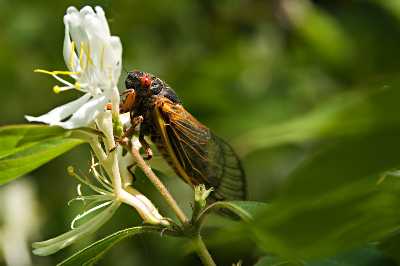
Brood X cicadas have now arrived in large numbers in the East and Midwest, providing back yard pets with a tasty treat. Veterinarian Mark Freeman from the Virginia-Maryland College of Veterinary Medicine at Virginia Tech says pet owners should be extra careful in the next few weeks.
“As a general rule, a pet can eat several cicadas without any complications. Most dogs find them quite fascinating, and will happily pick them up in their mouths. Once the pet discovers how delightfully crunchy they are, they will also happily eat them. And then eat more and more of them,” said Freeman, Clinical Assistant Professor in Community Practice at the Virginia-Maryland College of Veterinary Medicine at Virginia Tech.
“This is where the problems can develop. Gorging on cicadas can result in varying degrees of GI upset such as vomiting and diarrhea, stomach and intestinal pain, and even the possibility of an obstruction if they ingest too many shells which then can’t pass through.”
Dr. Freeman warns pet owners – if you see your pet take a cicada in his or her mouth, don’t try to take it away from them, as this could cause them to swallow the cicada whole, which presents a choking hazard.
“Either allow them to chew it up, then try to get it out of the mouth, or just allow them to chew it up and swallow it, but keep them away from any more.”
“One strong recommendation for dog owners prior to the hatch of the cicadas is to teach the pet the ‘leave it’ command. That way, when you’re out on a walk with your pet and they come across a number of cicadas, you can more easily keep them from ingesting a large number of them. If you have a young puppy, it would be ideal to keep them on leash and under control when out on walks to avoid the risk of ingesting large numbers of cicadas.”
If your pet gorges on cicadas, it would be recommended to see your veterinarian as soon as possible to establish an appropriate treatment plan based on the severity of clinical signs that develop.
“A little vomiting and diarrhea can be managed relatively easily, but severe GI pain or possible obstruction requires a much more aggressive intervention,” said Freeman “For those dogs who only ingest a few cicadas, the risk is very low for any complications or for treatment to be necessary.”
Experts from Virginia Tech’s department of entomology point out the Periodical Cicadas will be mostly gone by early July and not back for another 17 years. So it’s a once in an average pet’s lifetime that they will find them.










